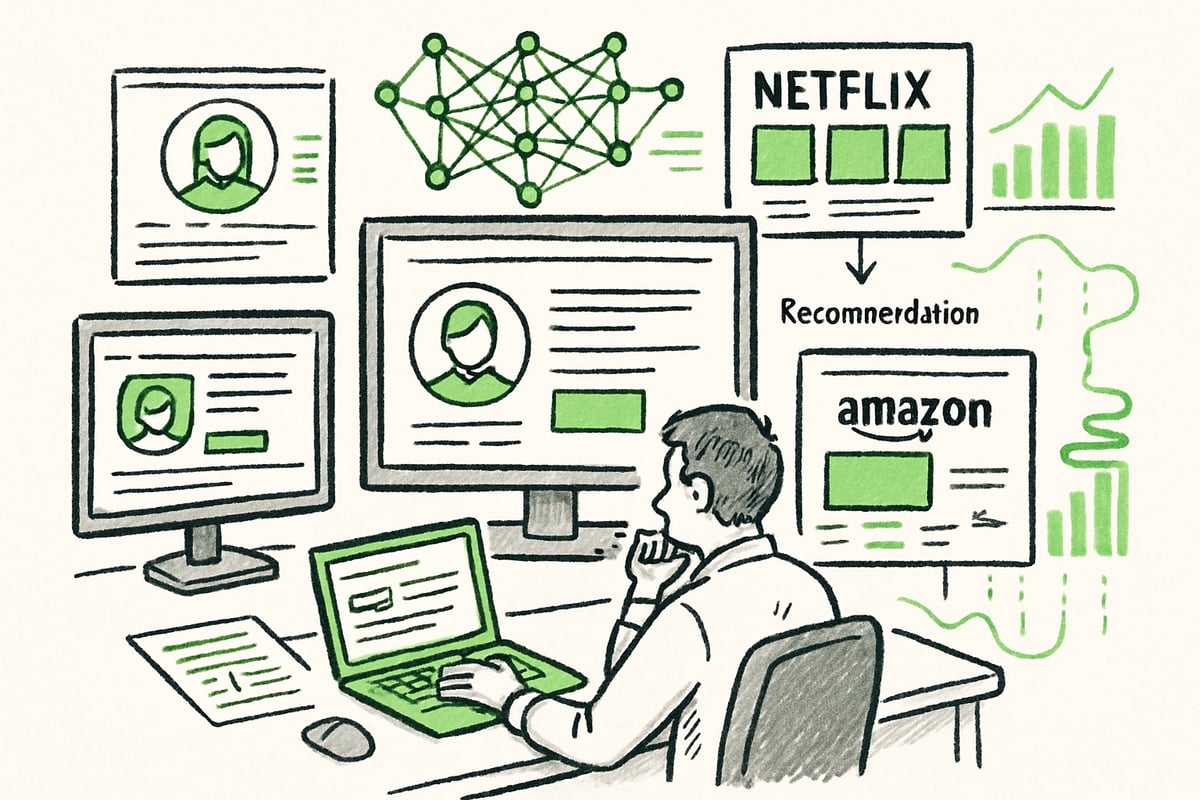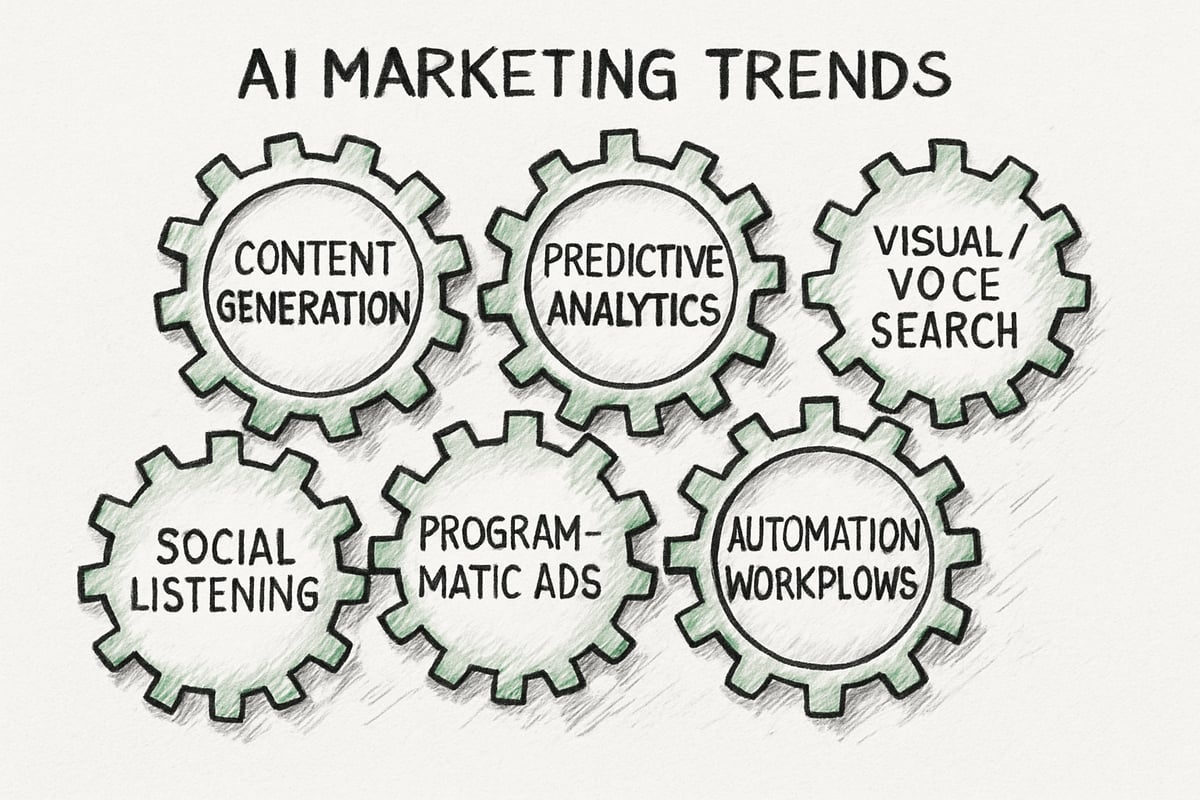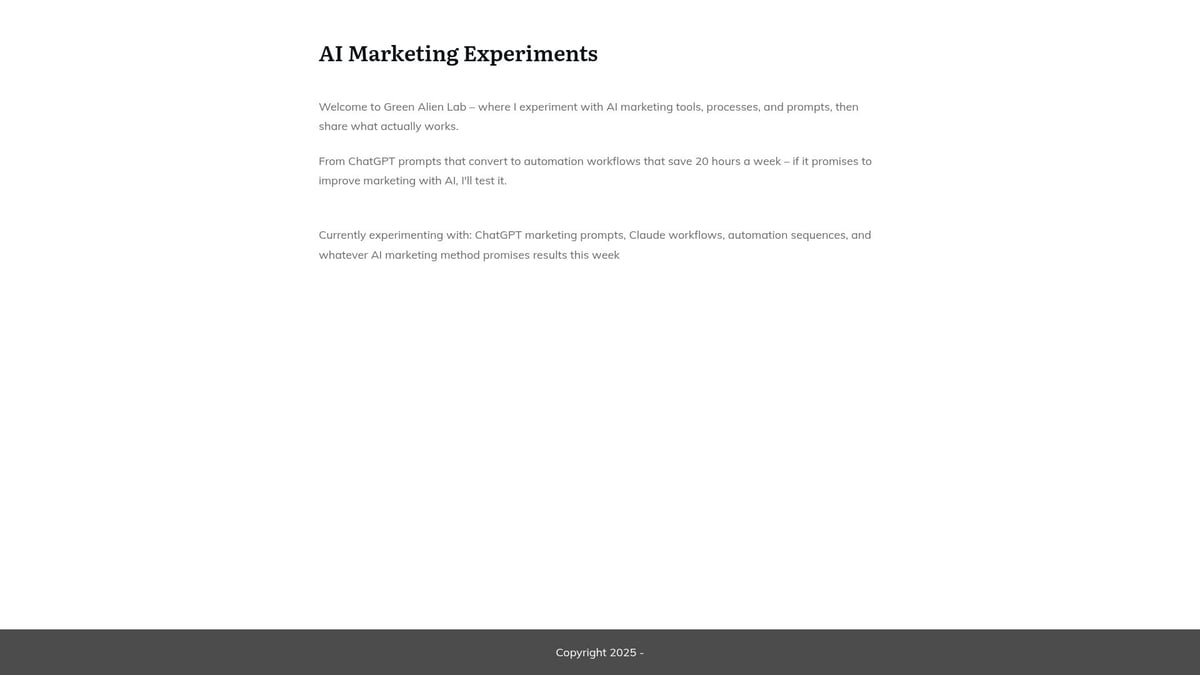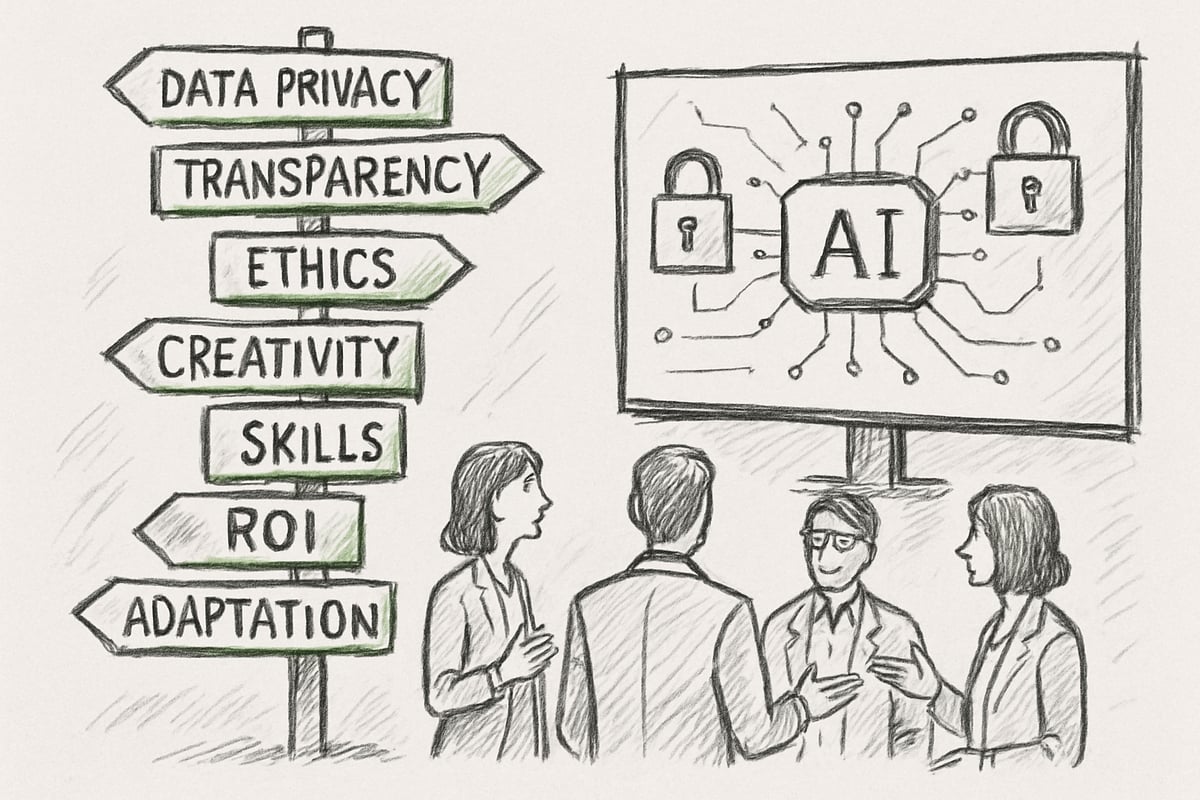AI is revolutionizing marketing faster than anyone imagined, and 2025 will mark a turning point for brands worldwide. This article dives into the most essential artificial intelligence marketing solution trends that are set to redefine how businesses connect with their audiences.
We will explore seven pivotal trends—from hyper-personalization and predictive analytics to chatbots, visual search, and AI-driven automation. Each trend offers marketers a chance to stay ahead or risk falling behind.
Curious how you can harness these innovations for a competitive edge? Read on for actionable insights and discover which artificial intelligence marketing solution will propel your strategy into the future.
The Rise of Hyper-Personalization in AI Marketing
Artificial intelligence marketing solution trends are redefining how brands connect with audiences. At the heart of this transformation is hyper-personalization—a dynamic approach that tailors marketing messages and experiences to the individual, not just the segment. In 2025, hyper-personalization will become a non-negotiable standard for any organization seeking a competitive edge.

What Is Hyper-Personalization in AI Marketing?
Hyper-personalization goes beyond traditional segmentation by using artificial intelligence marketing solution platforms to analyze real-time data from diverse sources. These include social media activity, purchase history, browsing patterns, and even location data. The result? Marketing that feels uniquely relevant to each individual.
AI enables marketers to identify subtle patterns and preferences, creating a marketing journey that adapts as the customer’s behavior changes. This level of personalization is only possible through advanced machine learning and predictive analytics.
Real-Time Data: The Fuel for Personalization
Artificial intelligence marketing solution tools process vast streams of data in real time. By integrating information from social, behavioral, and transactional sources, AI creates a comprehensive customer profile. This allows for immediate adjustments in messaging, offers, and content.
A prime example can be found in Netflix’s recommendation engine, which analyzes viewing habits to suggest shows tailored to each user. Similarly, Amazon uses dynamic product suggestions based on browsing and purchase history, maximizing the relevance of every interaction.
Case Studies: Netflix and Amazon
The success of Netflix and Amazon underscores the power of artificial intelligence marketing solution strategies. Netflix’s engine predicts what viewers will enjoy next, increasing watch time and loyalty. Amazon’s personalized product recommendations drive higher conversion rates and average order values.
According to Epsilon, 80% of consumers are more likely to purchase when brands offer personalized experiences. This data highlights the direct impact of hyper-personalization on business outcomes.
The Role of NLP and Ethical Considerations
Advances in natural language processing (NLP) have enabled artificial intelligence marketing solution providers to deliver truly personalized content and messaging. AI can now generate emails, ads, and website copy that speaks directly to an individual’s interests and intent.
However, as personalization deepens, ethical and privacy concerns grow. Marketers must balance the benefits of hyper-personalization with transparency and compliance. For an in-depth look at how AI delivers tailored experiences while navigating these challenges, see Hyper-Personalization at Scale.
Technologies and the Future of Hyper-Personalization
Key technologies driving this trend include machine learning, predictive analytics, and customer data platforms. These tools enable seamless integration with omnichannel strategies, allowing real-time, adaptive campaigns across email, social, web, and more.
Looking ahead to 2025, artificial intelligence marketing solution capabilities will empower brands to deliver consistent, individualized experiences at scale. Marketers who embrace hyper-personalization will set new standards for customer engagement and loyalty.
Top 7 Essential Artificial Intelligence Marketing Solution Trends 2025
Artificial intelligence marketing solution adoption is accelerating at an unprecedented pace. In 2025, seven key trends are redefining how brands connect with audiences, optimize campaigns, and drive results. Each trend not only enhances efficiency but also transforms the strategic landscape for digital marketers. Let’s explore these essential trends and see how they’re shaping the future of marketing.

1. AI-Driven Content Generation and Optimization
Artificial intelligence marketing solution tools are revolutionizing content creation. Generative AI platforms such as GPT-4 and Jasper are producing high-quality blog posts, ad copy, and social media updates at scale. These tools analyze audience preferences, recent trends, and SEO data to ensure every piece of content is relevant and engaging.
Content optimization is equally dynamic. AI-powered keyword analysis tools identify the best terms for visibility and adapt content for different platforms. Dynamic content adaptation means your message is tailored for each audience segment, increasing engagement and driving higher conversion rates.
Many brands now use artificial intelligence marketing solution platforms to automate blog production. For example, a leading e-commerce retailer scaled its product descriptions using AI, freeing creative teams for strategic work. However, maintaining brand voice and authenticity remains a challenge. Marketers must carefully review AI-generated content to ensure consistency and quality.
A quick comparison of leading AI content tools:
|
Tool |
Key Feature |
Use Case |
|---|---|---|
|
Jasper |
Brand voice templates |
Blog/ad copy |
|
GPT-4 |
Advanced NLP |
Long-form content |
|
Copy.ai |
Multi-language support |
Social media posts |
As content demands grow, artificial intelligence marketing solution adoption in this area will only intensify.
2. Predictive Analytics for Customer Behavior Forecasting
Predicting customer behavior is no longer a guessing game. Artificial intelligence marketing solution platforms leverage machine learning models to forecast purchasing intent, churn, and lifetime value. By analyzing large datasets, marketers can anticipate which leads are likely to convert and which customers may disengage.
In e-commerce, predictive analytics powers targeted campaigns and personalized offers. SaaS companies use these insights to optimize onboarding and retention. Predictive lead scoring aligns sales and marketing, ensuring resources are focused on the most promising prospects.
Spotify, for instance, uses predictive models to recommend playlists, enhancing user engagement and loyalty. According to Predictive Analytics in Marketing, brands deploying predictive analytics see a measurable increase in ROI and resource efficiency.
Integrating artificial intelligence marketing solution analytics allows for more agile campaign adjustment. The challenge lies in ensuring data quality and interpreting predictions accurately. As AI models mature, expect even more granular forecasts and real-time campaign optimization.
3. Intelligent Chatbots and Conversational AI
Conversational AI is transforming how businesses interact with customers. Artificial intelligence marketing solution chatbots have evolved from basic, rule-based responders to sophisticated agents capable of natural, multi-turn conversations.
These AI-driven chatbots provide instant, 24/7 support, qualify leads, and offer tailored recommendations. Integration with messaging apps and voice assistants ensures brands are accessible wherever customers are. For example, a major airline uses chatbots to handle booking changes, reducing wait times and improving satisfaction.
Artificial intelligence marketing solution adoption in this area also boosts conversion rates. Chatbots guide customers through the sales funnel, answer questions, and resolve issues in real time. However, complex queries may still require human intervention. The best deployments combine AI efficiency with seamless handoff to human agents.
As natural language processing advances, expect chatbots to handle more nuanced interactions, further enhancing customer experiences.
4. Visual and Voice Search Optimization with AI
Consumer behavior is shifting rapidly toward visual and voice search. Artificial intelligence marketing solution technologies excel at image recognition, alt-text generation, and understanding spoken queries. This shift demands a new approach to content optimization.
Brands now optimize product images and descriptions for platforms like Google Lens and Pinterest. Voice search optimization involves structuring content with conversational keywords and clear, concise answers. For example, Alexa and Google Assistant are driving a surge in product discovery via voice.
By 2025, Comscore forecasts that more than 50% of searches will be visual or voice-based. Artificial intelligence marketing solution platforms enable marketers to analyze search trends, adapt content, and maintain visibility across channels.
To succeed, marketers must ensure their websites are accessible, fast, and semantically structured. This not only improves search rankings but also provides a seamless experience across devices.
5. Automated Media Buying and Programmatic Advertising
Automated media buying is redefining digital advertising. Artificial intelligence marketing solution algorithms analyze user data, predict optimal ad placements, and execute real-time bidding for maximum impact.
Programmatic advertising platforms, such as The Trade Desk, use AI to reduce ad spend waste and improve targeting precision. Creative optimization tools generate dynamic ads tailored to audience segments, increasing engagement and conversions.
A summary table of programmatic advertising benefits:
|
Feature |
Benefit |
|---|---|
|
Real-time bidding |
Efficient ad spend |
|
Dynamic personalization |
Higher conversion |
|
Fraud detection |
Increased transparency |
While artificial intelligence marketing solution adoption streamlines media buying, challenges persist. Ad fraud and transparency concerns require ongoing vigilance. Marketers must also ensure campaigns align with brand guidelines and ethical standards.
As programmatic technology evolves, expect even greater automation and integration with other marketing channels.
6. AI-Powered Social Listening and Sentiment Analysis
Understanding audience sentiment is crucial for brand success. Artificial intelligence marketing solution platforms monitor millions of conversations across social media, forums, and review sites in real time.
Natural language processing tools extract actionable insights from unstructured data. Marketers can track brand mentions, spot emerging trends, and identify potential crises early. Coca-Cola, for example, leverages AI-powered social listening to guide product innovation and respond to consumer feedback.
Artificial intelligence marketing solution sentiment analysis enables brands to adjust campaigns on the fly. However, detecting sarcasm, nuance, and multilingual sentiment remains a technical challenge. Marketers must supplement AI findings with human review for accuracy.
The future promises even more sophisticated sentiment models and integration with broader customer experience strategies.
7. AI-Enabled Marketing Automation Workflows
Marketing automation is entering a new era with artificial intelligence marketing solution integration. AI-driven workflows connect CRM, email, and multichannel campaigns, allowing marketers to deliver personalized experiences at scale.
Features like predictive send times and personalized drip sequences ensure messages reach customers when they are most likely to engage. HubSpot’s AI-powered automation tools, for example, help marketers nurture leads and convert them efficiently.
Marketers report saving hours every week thanks to artificial intelligence marketing solution automation. This efficiency allows teams to focus on strategy and creative development. The next wave of automation will see deeper connections between marketing, sales, and customer service platforms.
As organizations adopt these advanced workflows, they can expect greater consistency, higher conversion rates, and improved customer relationships.
Green Alien Lab: Experiment-Driven AI Marketing Insights
Green Alien Lab stands out in the crowded world of artificial intelligence marketing solution providers by focusing exclusively on real-world experimentation. Rather than relying on theory or hype, the lab rigorously tests the latest AI marketing tools and workflows to uncover what genuinely drives results. This experiment-driven approach empowers marketers to make informed, confident choices in a fast-changing landscape.

At the heart of Green Alien Lab’s methodology is continuous hands-on evaluation. The team puts each artificial intelligence marketing solution through its paces, assessing performance in real scenarios—content generation, automation workflows, and campaign management. By analyzing outcomes and sharing transparent results, the lab ensures that digital marketers, agencies, and business owners receive unbiased, actionable insights tailored to their needs.
What does Green Alien Lab offer for those eager to master artificial intelligence marketing solution trends? Their platform provides:
-
In-depth, side-by-side tool reviews
-
Curated prompt libraries for faster content creation
-
Step-by-step workflow guides for automation
-
Regular updates on the most effective AI strategies
These resources are designed to save marketers up to 20 hours per week. The lab’s transparent reporting and evidence-based recommendations build trust, setting it apart from competitors who rely solely on predictions or untested claims. For those seeking experiment-backed guidance, the lab’s focus on measurable outcomes is a key differentiator.
Staying ahead in the evolving world of artificial intelligence marketing solution adoption requires access to the latest, proven insights. Green Alien Lab invites you to explore their tested recommendations and experiment-driven resources. By leveraging their findings, you can confidently navigate the future of AI marketing and maintain a clear competitive edge.
Challenges and Considerations for AI Marketing in 2025
Artificial intelligence marketing solution adoption is accelerating, yet the path forward in 2025 is filled with both promise and complexity. Marketers face a landscape reshaped by rapid technological evolution, stricter regulations, and shifting consumer expectations. Navigating these challenges is essential for any organization seeking to lead in the AI-driven marketing era.

Data Privacy and Evolving Regulations
Data privacy is a cornerstone concern in any artificial intelligence marketing solution strategy. Regulations like GDPR and CCPA have set strict boundaries for collecting, processing, and storing customer data. Marketers must ensure compliance or risk substantial penalties and loss of consumer trust.
Real-time data analysis, essential for personalization, must be balanced with responsible data stewardship. As privacy expectations grow, transparent consent management and secure data storage are non-negotiable. Brands that prioritize privacy will not only comply, but also build stronger customer relationships.
Transparency and Explainability in AI Decisions
Trust in artificial intelligence marketing solution implementation depends on transparency. Stakeholders, from consumers to regulators, demand to know how AI-driven decisions are made. Black-box algorithms can undermine confidence and invite regulatory scrutiny.
Organizations are increasingly expected to provide clear explanations for automated actions, particularly in sensitive areas like ad targeting or content recommendations. As highlighted in AI’s Strategic Takeover in Marketing, explainability is now central to responsible AI adoption, shaping both strategy and operations.
Managing Bias and Ethical Concerns
Bias in artificial intelligence marketing solution processes remains a persistent challenge. AI systems trained on historical data may inadvertently perpetuate stereotypes or discriminatory outcomes. To mitigate this, marketers must audit datasets, monitor outcomes, and implement bias-detection protocols.
Ethical considerations extend to respecting consumer autonomy, avoiding manipulation, and ensuring fair representation in marketing content. Proactive governance frameworks and diverse development teams are vital to uphold ethical standards.
Balancing Automation with Human Creativity
Automation is at the heart of every artificial intelligence marketing solution, yet human creativity is irreplaceable. The most effective strategies blend AI-driven efficiency with authentic, emotionally resonant messaging.
Marketers should use AI to handle repetitive tasks—data analysis, segmentation, and optimization—while reserving space for creative ideation and storytelling. This synergy fosters originality and maintains a brand’s unique voice in an increasingly automated world.
Skills Gap: Upskilling Marketing Teams
The adoption of any artificial intelligence marketing solution demands new skill sets. Marketers must develop proficiency in data science, AI tool management, and ethical oversight. Upskilling programs, workshops, and cross-disciplinary collaboration can bridge these gaps.
Companies investing in ongoing education will position their teams to harness AI’s full potential, reducing reliance on external experts and ensuring internal capability growth.
Budget Considerations and ROI
Investing in an artificial intelligence marketing solution requires careful budgeting. Initial costs for software, integration, and training can be significant. However, the long-term ROI—through improved targeting, efficiency, and campaign performance—can far outweigh the expense.
Marketers should prioritize solutions with clear value propositions and measurable outcomes. Regular ROI analysis ensures that investments align with business objectives and deliver sustained benefits.
Real-World Case Studies: Overcoming AI Challenges
Numerous brands have successfully navigated the complexities of artificial intelligence marketing solution deployment. For example, global retailers have implemented AI-driven personalization while maintaining compliance through robust data governance.
SaaS companies have leveraged AI for predictive analytics, improving customer retention without compromising ethical standards. These successes highlight the importance of aligning technology with transparent, customer-centric processes.
Continuous Experimentation and Adaptation
The artificial intelligence marketing solution landscape is dynamic, demanding ongoing experimentation. Marketers must test new tools, refine algorithms, and adapt to regulatory changes. As noted in AI in Marketing 2025 Predictions, agility and a willingness to learn from real-world outcomes are key to maintaining a competitive edge.
By fostering a culture of innovation and adaptability, organizations can future-proof their marketing strategies—turning challenges into opportunities for growth.
